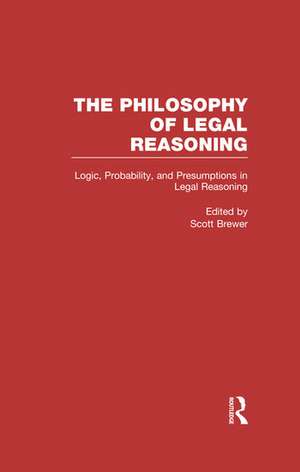Logic, Probability, and Presumptions in Legal Reasoning: Philosophy of Legal Reasoning: A Collection of Essays by Philosophers and Legal Scholars
Editat de Scott Breweren Limba Engleză Hardback – mar 1998
Preț: 1336.49 lei
Preț vechi: 1629.86 lei
-18% Nou
Puncte Express: 2005
Preț estimativ în valută:
255.74€ • 267.56$ • 212.44£
255.74€ • 267.56$ • 212.44£
Carte tipărită la comandă
Livrare economică 03-17 aprilie
Preluare comenzi: 021 569.72.76
Specificații
ISBN-13: 9780815326557
ISBN-10: 0815326556
Pagini: 414
Ilustrații: illustrations
Dimensiuni: 152 x 229 x 31 mm
Greutate: 0.73 kg
Ediția:1
Editura: Taylor & Francis
Colecția Routledge
Seria Philosophy of Legal Reasoning: A Collection of Essays by Philosophers and Legal Scholars
Locul publicării:Oxford, United Kingdom
ISBN-10: 0815326556
Pagini: 414
Ilustrații: illustrations
Dimensiuni: 152 x 229 x 31 mm
Greutate: 0.73 kg
Ediția:1
Editura: Taylor & Francis
Colecția Routledge
Seria Philosophy of Legal Reasoning: A Collection of Essays by Philosophers and Legal Scholars
Locul publicării:Oxford, United Kingdom
Cuprins
Chapter 1 SYMBOLIC LOGIC: A RAZOR-EDGED TOOL FOR DRAFTING AND INTERPRETING LEGAL DOCUMENTS, LAYMAN E. ALLEN; Chapter 2 EXEMPLARY REASONING: SEMANTICS, PRAGMATICS, AND THE RATIONAL FORCE OF LEGAL ARGUMENT BY ANALOGY BY ANALOGY, Scott Brewer; Chapter 3 Subjective Probability and the Paradox of the Gatecrasher, L. Jonathan Cohen; Chapter 4 THE PLACE OF LOGIC IN THE LAW; Chapter 5 Logical Method and Law, JOHN DEWEY; Chapter 6 The Laws of Probability and the Law of the Land, David Kayet; Chapter 7 REASON AND LOGIC IN THE COMMON LAW; Chapter 8 LOGIC AND LAW; Chapter 9 LAW LOGIC, JEFFRIE G. MURPHY; Chapter 10 THE EVIDENCE OR THE EVENT? ON JUDICIAL PROOF AND THE ACCEPTABILITY OF VERDICTS, Charles Nesson; Chapter 11 LOGIC IN THE LAW, EDWIN W. PATTERSON; Chapter 12 A NOTE ON SYMBOLIC LOGIC AND THE LAW, ROBERT S. SUMMERS; Chapter 13 SYNTACTIC AMBIGUITY, CONCEPTUAL VAGUENESS, AND THE LAWYER'S HARD THINKING, ILMAR TAMMELO; Chapter 14 TRIAL BY MATHEMATICS: PRECISION AND RITUAL IN THE LEGAL PROCESS, Laurence H. Tribe;
Descriere
At least since plato and Aristotle, thinkers have pondered the relationship between philosophical arguments and the "sophistical" arguments offered by the Sophists -- who were the first professional lawyers. Judges wield substantial political power, and the justifications they offer for their decisions are a vital means by which citizens can assess the legitimacy of how that power is exercised. However, to evaluate judicial justifications requires close attention to the method of reasoning behind decisions. This new collection illuminates and explains the political and moral importance in justifying the exercise of judicial power.




